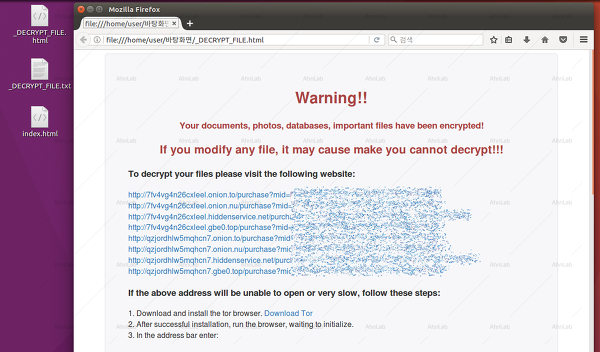Nayana, a web hosting provider based in South Korea, announced it is in the process of paying a three-tier ransom demand of nearly $1 million worth of Bitcoin, following a ransomware infection that encrypted data on customer’ servers.
The ransomware infection appears has taken place on June 10, but Nayana admitted to the incident two days later, in a statement on its website.
Attackers asked for an initial ransom payment of 550 Bitcoin, which was worth nearly $1.62 million at the time of the request.
Company negotiated a smaller ransom payment
After two days of negotiations, Nayana staff said they managed to reduce the ransom demand to 397.6 Bitcoin, or nearly $1 million.
In a subsequent announcement, Nayana officials stated that they negotiated with the attackers to pay the ransom demand in three installments, due to the company’s inability to produce such a large amount of cash in a short period of time.
On Saturday, June 17, the company said it already paid two of the three payment tranches. In subsequent announcements [1, 2], Nayana updated clients on the server decryption process, saying the entire operation would take up to ten days due to the vast amount of encrypted data.
The company said 153 Linux servers were affected, servers which stored the information of more than 3,400 customers.
Servers encrypted by Erebus Linux ransomware
According to Nayana, the name of this ransomware is Erebus. The name is the same with a ransomware family that appeared last year and resurfaced again in February 2017, but that ransomware targeted Windows computers.
This version — analysis here by AhnLab, Hauri, and Trend Micro — targets only Linux computers. It is unclear if the two Windows versions spotted previously are related to the Linux version that hit Nayana, or if this is just another case where crooks used the same name for their ransomware strain.
The ransomware encrypts the following file types:
tar, gz, tgz, taz, bz, tbz, bz2, lz, lzma, lz4, contact, dbx, doc, docx, jnt, jpg, mapimail, msg, oab, ods, pdf, pps, ppsm, ppt, pptm, prf, pst, rar, rtf, txt, wab, xls, xlsx, xml, zip, 1cd, 3ds, 3g2, 3gp, 7z, 7zip, accdb, aoi, asf, asp, aspx, asx, avi, bak, cer, cfg, class, config, css, csv, db, dds, dwg, dxf, flf, flv, html, idx, js, key, kwm, laccdb, ldf, lit, m3u, mbx, md, mdf, mid, mlb, mov, mp3, mp4, mpg, obj, odt, pages, php, psd, pwm, rm, safe, sav, save, sql, srt, swf, thm, vob, wav, wma, wmv, xlsb, 3dm, aac, ai, arw, c, cdr, cls, cpi, cpp, cs, db3, docm, dot, dotm, dotx, drw, dxb, eps, fla, flac, fxg, java, m, m4v, max, mdb, pcd, pct, pl, potm, potx, ppam, ppsm, ppsx, pptm, ps, pspimage, r3d, rw2, sldm, sldx, svg, tga, wps, xla, xlam, xlm, xlr, xlsm, xlt, xltm, xltx, xlw, act, adp, al, bkp, blend, cdf, cdx, cgm, cr2, crt, dac, dbf, dcr, ddd, design, dtd, fdb, fff, fpx, h, iif, indd, jpeg, mos, nd, nsd, nsf, nsg, nsh, odc, odp, oil, pas, pat, pef, pfx, ptx, qbb, qbm, sas7bdat, say, st4, st6, stc, sxc, sxw, tlg, wad, xlk, aiff, bin, bmp, cmt, dat, dit, edb, flvv, gif, groups, hdd, hpp, log, m2ts, m4p, mkv, mpeg, ndf, nvram, ogg, ost, pab, pdb, pif, png, qed, qcow, qcow2, rvt, st7, stm, vbox, vdi, vhd, vhdx, vmdk, vmsd, vmx, vmxf, 3fr, 3pr, ab4, accde, accdr, accdt, ach, acr, adb, ads, agdl, ait, apj, asm, awg, back, backup, backupdb, bank, bay, bdb, bgt, bik, bpw, cdr3, cdr4, cdr5, cdr6, cdrw, ce1, ce2, cib, craw, crw, csh, csl, db_journal, dc2, dcs, ddoc, ddrw, der, des, dgc, djvu, dng, drf, dxg, eml, erbsql, erf, exf, ffd, fh, fhd, gray, grey, gry, hbk, ibank, ibd, ibz, iiq, incpas, jpe, kc2, kdbx, kdc, kpdx, lua, mdc, mef, mfw, mmw, mny, moneywell, mrw, myd, ndd, nef, nk2, nop, nrw, ns2, ns3, ns4, nwb, nx2, nxl, nyf, odb, odf, odg, odm, orf, otg, oth, otp, ots, ott, p12, p7b, p7c, pdd, pem, plus_muhd, plc, pot, pptx, psafe3, py, qba, qbr, qbw, qbx, qby, raf, rat, raw, rdb, rwl, rwz, s3db, sd0, sda, sdf, sqlite, sqlite3, sqlitedb, sr2, srf, srw, st5, st8, std, sti, stw, stx, sxd, sxg, sxi, sxm, tex, wallet, wb2, wpd, x11, x3f, xis, ycbcra, yuv, mab, json, ini, sdb, sqlite-shm, sqlite-wal, msf, jar, cdb, srb, abd, qtb, cfn, info, info_, flb, def, atb, tbn, tbb, tlx, pml, pmo, pnx, pnc, pmi, pmm, lck, pm!, pmr, usr, pnd, pmj, pm, lock, srs, pbf, omg, wmf, sh, war, ascx, tif… but it skips encryption for files found in the following folders:
/bin, /boot, /dev, /etc, /lib, /lib64, /proc, /run, /sbin, /srv, /sys, /tmp, /usr, /var, /.gem, /.bundle, /.nvm, /.npmOnce the encryption process ends, it drops two ransom notes named “_DECRYPT_FILE.html” and “_DECRYPT_FILE.txt” on the user’s desktop.

Payments are handled via two Tor onion sites:
7fv4vg4n26cxleel.onion
7fv4vg4n26cxleel.onion.to
7fv4vg4n26cxleel.onion.nu
7fv4vg4n26cxleel.hiddenservice.net
7fv4vg4n26cxleel.gbe0.top
qzjordhlw5mqhcn7.onion
qzjordhlw5mqhcn7.onion.to
qzjordhlw5mqhcn7.onion.nu
qzjordhlw5mqhcn7.hiddenservice.net
qzjordhlw5mqhcn7.gbe0.topA Trend Micro analysis of the Nayana systems reveals endemic problems. It is no surprise that the hosting provider fell victim to this infection.

Working as a cyber security solutions architect, Alisa focuses on application and network security. Before joining us she held a cyber security researcher positions within a variety of cyber security start-ups. She also experience in different industry domains like finance, healthcare and consumer products.











